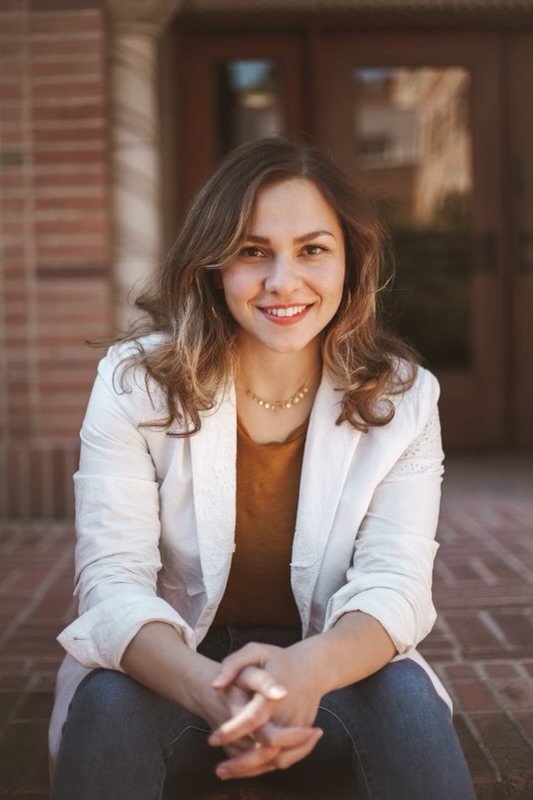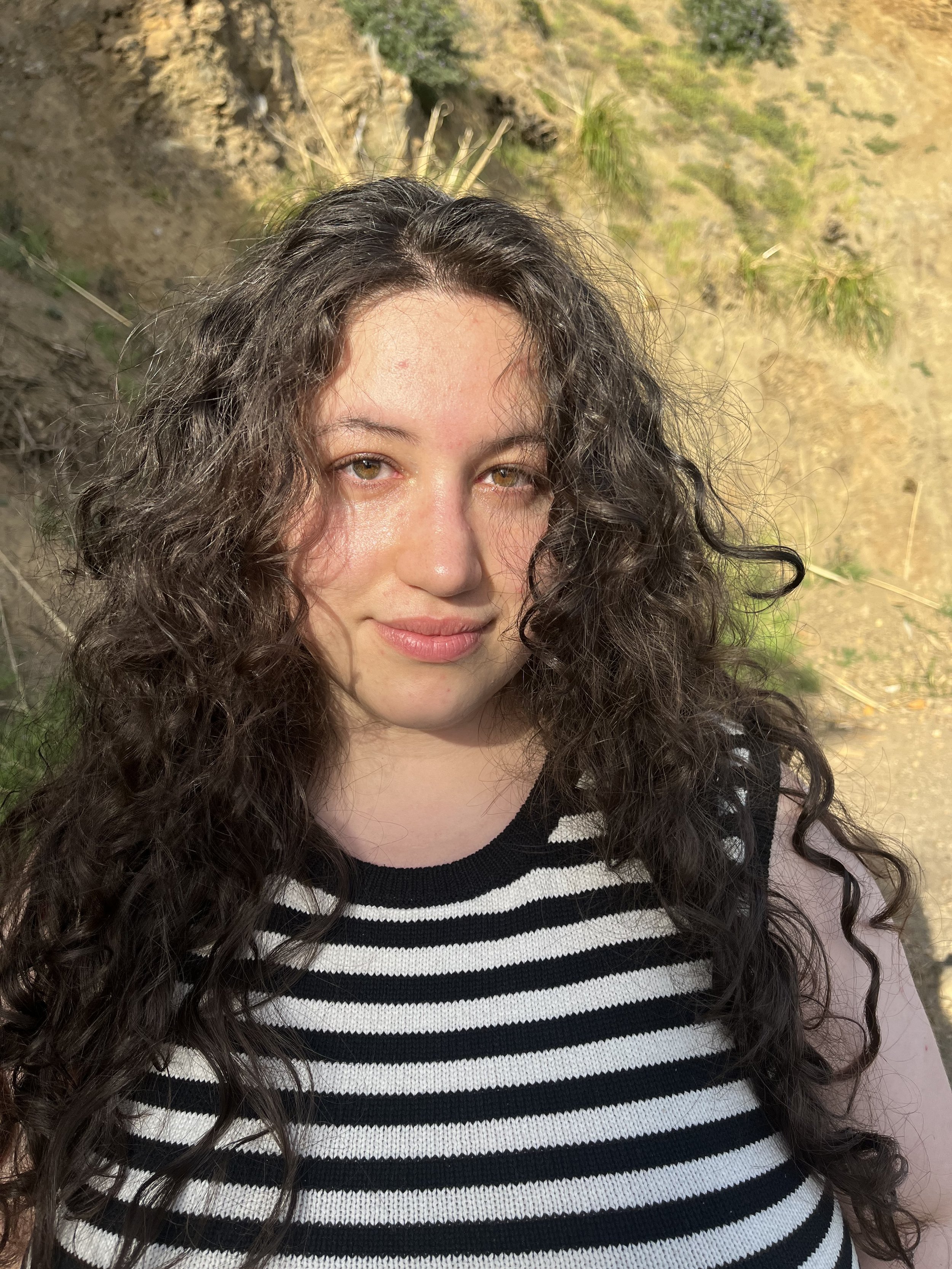Postcard from Grace Martino and Leah Ofman
In SFGC’s Postcard series, our guest artists, collaborators, and faculty take us behind the scenes and share an intimate look into their thoughts about music, life, and art-making.
This postcard features two of our newest staff members, Director of Artistic Operations Grace Martino and Marketing Coordinator Leah Ofman.
Instead of our usual postcard format, Leah and Grace had a chat about their experiences with music, life outside of music, and more about music. The transcription of their conversation is below; get to know them as they get to know each other!
Grace and Leah in Conversation
L: Hi Grace! So excited to talk with you!
G: Hi Leah! Same here!
L: So, you studied opera in college?
G: Yes, at UCLA. I actually started as a choral studies major, but at my first “sing-in” (which is a mock audition that everyone does at the beginning of the year), they asked me to do Opera. I still kept doing everything choir, but also all the opera things. In my Junior and Senior years I joined the Seraphic Fire Young Artists Program, where we did two professional concert series with them per year. My ensemble at UCLA won a Grammy for best choral performance for a piece written for us by Richard Danielpour that we recorded in Buffalo with JoAnn Falletta.
L: Wow!
G: I also played a nun in the world premiere of Juana by Carla Lucero, which was a commission for UCLA about Juana Ines de la Cruz.
L: So after college, how did you end up at SFGC?
G: I was working for Long Beach Camerata right after school, and ended up in a long distance relationship with someone who lived here. I was looking for a change after living in LA for the past couple of years, so I decided to move here without having a job secured. Then I applied to SFGC, and now I’m here! What about you? You went to NYU right?
L: Yes, and I studied music too actually! I majored in composition at NYU, and I went in thinking I was gonna be a film scorer.
G: I thought I was going to study film directing!
L: Shut up!
G: I’m dead serious.
L: In an alternate universe, I’m scoring a film you’re directing right now. But in this universe, it turns out that I’m not the biggest fan of film scoring - I didn’t always like working with directors because we were usually speaking a different artistic language. So then I started getting interested in experimental music and aleatoric notation, and alternate means of sound creation. Meanwhile, I minored in philosophy, so I wanted to use music as a tool to explore non-musical concepts. I ended up becoming a really philosophical writer. I also co-artistic directed the NYU Pulsing & Shaking new music festival in my junior and senior years, and I got to study with Caroline Shaw my senior year!
G: So how do you notate your compositions, if at all?
L: They are notated, but I try to think about the effects on the audience that the sounds are trying to achieve, and find the easiest way for the performers to read and create those sounds. A lot of the time I find that getting caught up in the details of the notation and precise timings can take away from the performance, since it makes it more difficult for the performers, and that takes away from the audience’s experience. If you release the details to the performers and focus on the big picture, the effect of the music becomes so much more palpable.
The SFGC Counselor Chorus 2022, conducted by Chris Martin, performs Leah’s composition “She breathes.”
L: You and I are both pretty new to working at SFGC. So far, what inspires you about working here?
G: I think mainly and namely it’s that I was in an organization like this; it was coed but it was a group outside of my school that was specifically for championing the arts, which - I still have friends from that group, and this was in middle school! And most of them are still working in the arts in some capacity. I think it was really important and integral to my development as a whole person. Where I grew up, when you’re involved in the arts program you’re inundated with advisors saying “there’s no money for this,” and “your IB programs come first, your AP programs come first,” which is not inherently bad…
L: But it’s not inherently good either.
G: Yeah, and it’s being shoved down your throat that these arts activities always come second. And to have a place like this really gives you a space to be like, “actually, this is my first. This will always be my first.” So I think that’s why I was drawn to this as opposed to, say, the opera or the symphony.
L: Yes! I grew up singing here at SFGC, so for me working here is very much a homecoming, and a return to where so much of my artistic development took place. My first year singing in Premier Ensemble (which used to be called Chorissima) was also Valérie’s first year directing it. It’s crazy to think that it’s been a full decade since then. I think singing with SFGC was what got me started on the new music train. And actually, one of the first conversations you and I had was about how passionate we are about new music! So for this conversation, I wanted to ask you more about your thoughts on contemporary music.
G: My thoughts are that everyone should be doing new music. You’re wasting your time if you’re not doing new compositions! In performances where the piece was brand new or the majority of the program was new, I felt like at the end of those shows I could feel a tangible difference in my ability to make music.
L: Right.
G: Part of that too is being able to work with the composer and knowing exactly what the composer wanted instead of having to guess.
L: I actually asked the choristers here in PE why they liked doing new music, and they said that exact thing! Having the composer in the room, or at least accessible, is game-changing.
G: Like, that Richard Danielpour project I did at UCLA, that was a mountain of a piece, and I can’t imagine having to do it without him there. And also being there for live changes is really cool, because you know that that piece will be done for many many years, and you were part of the initial shaping of the piece with the composer.
L: Yes, and then the first recording becomes a part of the score, which I think is so cool because it’s like a return to oral tradition, which is something I think “Western music” has encouraged us to abandon. There’s almost this expectation where if it’s not notated or written down in this particular way we learned about in theory class, then it doesn’t count. It’s not to be taken seriously. I feel like new music has that transformative aspect you mentioned because it’s a reflection of what our time is now, and I like to think about it in terms of what people will look at and study in however many decades. The stuff we’re overlooking now is going to be the stuff they’re trying desperately to uncover, to understand what was going on for us. So it’s incredibly exciting to be doing new things that tell the story that we’re living in, and continuing to progress the artform.
35-mm photo by Grace of Goat Rock Beach in Jenner, California.



